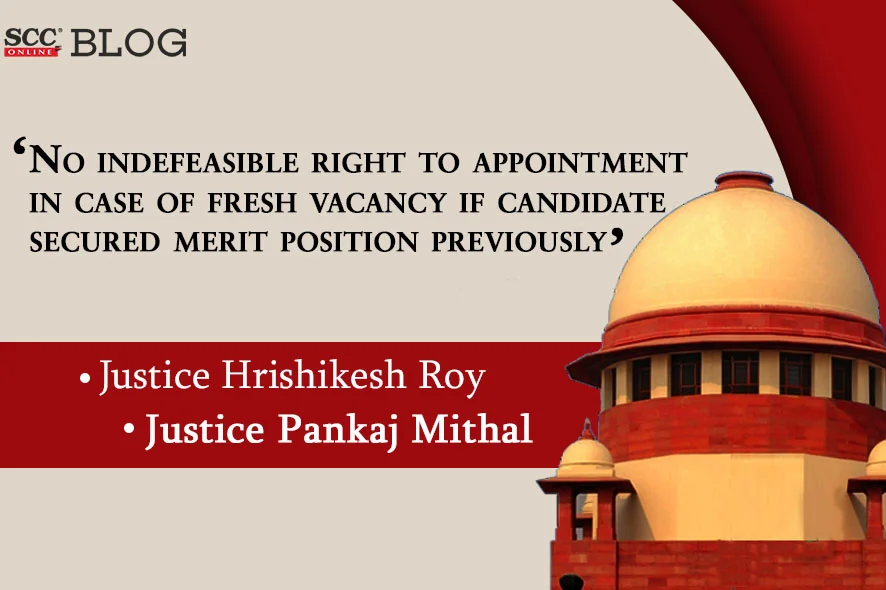Supreme Court: In a civil appeal against the Judgment and order of Punjab and Haryana High Court, whereby the appellant was not granted any relief for his appointment to the higher judicial service of the State under direct recruitment quota, the Division Bench of Hrishikesh Roy and Pankaj Mithal*, JJ. dismissed the appeal and refused to interfere with the impugned decision. The Court held that the appellant had not acquired any indefeasible right to be appointed because he had qualified in the selection process.
Background
A notification for selection/recruitment of 22 officers in the Haryana Superior Judicial Service by direct recruitment from the Bar, out of which, fourteen from general category, five from scheduled caste and three of the backward class, was published by the High Court on 18-05-2007. The selection was to be made in accordance with the provisions of the Haryana Superior Judicial Service Rules, 2007, (‘Rules, 2007’) with the twenty-five percent quota for direct recruitment from the Bar. In the matter at hand, the appellant was one of the candidates who had applied for the post. The candidate qualified the written examination and the interview and secured the 14th position in the merit list of the general category candidates, however, he was not appointed. Although fourteen candidates were to be selected from the general category, the appellant was not selected. Later, one of the thirteen candidates who were appointed for the service resigned, hence the petitioner sought his appointment.
The appellant approached the High Court, seeking his appointment against the fourteenth general candidate post, and on the grounds that one of the candidates had resigned, therefore, the said post could not be kept vacant in an arbitrary manner. However, no relief was granted to the appellant.
Decision
The Court referred to Shankarsan Dash v. Union of India, (1991) 3 SCC 47, whereby, it was held that it is up to the employer or the State to fill up all the notified vacancies or to keep all of them or any of them vacant but it does not mean that the State can act arbitrarily in not filling up those posts and the decision not to fill up the vacancies has to be a bona fide one supported by appropriate reasons. The Court also noted that the State is not under any obligation to fill up all the advertised vacancies as per Rules, 2007.
The Court referred to slew of directions given in Brij Mohan Lal v. Union of India, (2002) 5 SCC 1, for proper implementation of the Fast Track Court scheme envisaged by the Central Government. The Court noted that it was directed in Brij Mohan Lal v. Union of India, (2012) 6 SCC 502, for creation of additional 10 percent posts for the absorption of Fast Track Court judges; all those who were appointed by way of direct recruitment from the Bar under the Fast Track Court Scheme would be entitled to be appointed to the regular cadre of the higher judicial services of the respective States; candidates who were promoted as Fast Track Court judges from the post of Civil Judge (Senior Division) having requisite experience in service shall be entitled to be absorbed and remain promoted to the higher judicial service of the State against the 25 percent quota after giving due weightage to the fact that they had already put in a number of years’ service in the higher judicial service.
The Court noted that five vacancies out of fourteen were filled up by absorption of the Fast Track Court judges in terms of the directions contained in the Brij Mohan Lal (1) and (2) (supra), rest all the vacancies were filled by the 13 selected candidates, hence, the appellant could not be appointed as he was the fourteenth candidate in the merit list.
The Court said that the absorption of Fast Track Court judges was done after following the prescribed procedure for the selection and was in accordance with the direction given in Brij Mohan Lal (1) and (2) (supra). Therefore, the Court opined that the appointment of the selected thirteen candidates and leaving the fourteenth candidate was not an arbitrary action. The Court also stated that the action was fair and logical without any malice. Thus, the Court upheld the impugned decision of the High Court and was not liable to be interfered with specifically when the appellant had not acquired any indefeasible right to be appointed because he qualified in the selection process.
Regarding the contention that the appellant could be appointed in the place of the selected candidate who had subsequently resigned from his post, the Court said that the argument was bereft of merit and if one of the selected candidates joins and then resigns, it gives rise to a fresh vacancy which could not be filled up without issuing a proper advertisement and following the fresh selection process. The Court also said that it would be travesty of Justice to keep open the selection process and direct the appointment on basis of a selection process which was initiated by the High Court way back in the year 2007, and now sixteen years have passed.
Thus, the Court dismissed the appeal.
[Sudesh Kumar Goyal v. State of Haryana, 2023 SCC OnLine SC 1201, Decided on 21-09-2023]
*Judgment Authored by: Justice Pankaj Mithal
Know Thy Judge | Supreme Court of India: Justice Pankaj Mithal






